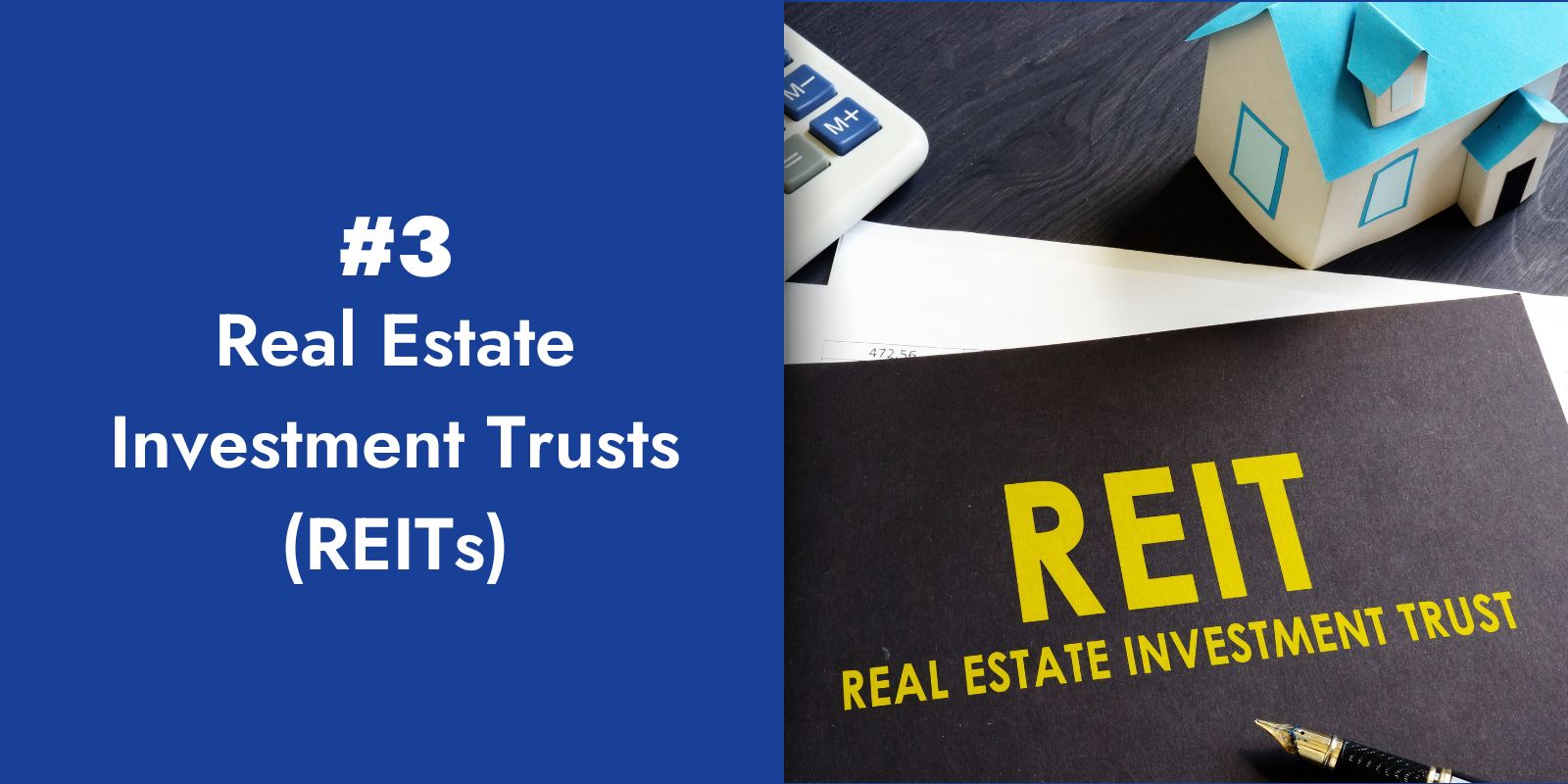Are you considering taking the plunge into real estate investing?
It can seem like a daunting endeavor, with so much to learn and execute on.
But once you understand how it works and take your first steps toward success.
There’s an incredible sense of accomplishment from building something of lasting value – not to mention the potential financial returns that come along with it.
In this guide, we’ll help equip you with everything you need to know about starting out in real estate investing, from setting realistic goals for yourself and learning tips and tricks on navigating the market safely.
So why wait any longer?
Let’s get started!

Why Invest in Real Estate?
Did you know that real estate can actually enhance the risk and return of your investment portfolio?
It offers competitive risk-adjusted returns and is generally considered to be low volatility compared to equities and bonds.
But that’s not all!
Real estate is even more appealing when you compare it to other traditional sources of income return.
This asset class normally trades at a yield premium to U.S. Treasuries, making it especially attractive when Treasury rates are low.
Investing in real estate can truly be a game-changer for your portfolio!

5 Ways to Get Started With Real Estate Investing
When it comes to investment options, there are plenty to choose from.
You’ve got stocks, bonds, exchange-traded funds, mutual funds, and of course, real estate.
Regardless of your experience level, these are all good investments.
However, if you’re just starting out, it might be best to steer clear of forex or cryptocurrency due to their volatile nature.
Now, which option is right for you depends on:
- How involved you want to be
- The amount of money you’re starting with
- How much risk you’re comfortable taking on
These factors will help you make an informed decision.
Let’s talk about real estate investments.
They can be both satisfying and lucrative.
Unlike stock and bond investments, you can leverage your money to buy a property by paying a portion of the total cost upfront and paying off the rest over time, with some interest, of course.
So, what makes a good real estate investment?
It’s all about the chances of success, or return on investment.
If there’s a high level of risk involved, there should be a potential for a high reward as well.
But remember, even if you choose investments with a high chance of success, there are no guarantees.
Only invest money you can afford to lose.
While traditional mortgages may require a 20% to 25% down payment, in some cases, you can purchase a property with just 5% down.
This level of control empowers real estate flippers and landlords, who can take out second mortgages on their current properties to make down payments on additional properties.
Now, let’s explore five key ways investors can make money in real estate.

1. Rental Properties
Investing in rental properties can be a lucrative endeavor, but before you dive in, let’s talk about what it means to be a landlord.
As a landlord, you’ll take on the responsibility of managing various aspects of the property:
- Paying the mortgage, property taxes, and insurance
- Handling maintenance
- Finding tenants
- Addressing any issues that may arise
It’s a hands-on investment that requires your time and effort unless you opt for a property manager to handle the nitty-gritty details.
When it comes to making money as a landlord, there are two main avenues to consider.
First, there’s rent collection.
The amount you can charge for rent depends on the location of the rental property.
It’s crucial to strike the right balance: charge too much and you risk scaring away potential tenants, charge too little and you might be leaving money on the table.
A common approach is to set the rent at a level that covers your expenses until the mortgage is paid off, allowing the majority of the rent to become profit.
The second-way landlords profit is through property appreciation.
If your property increases in value over time, you could sell it for a profit or leverage the equity to invest in another property.
However, it’s important to note that real estate appreciation is not guaranteed.
It can fluctuate, especially during times of volatility, as we’ve seen during the COVID-19 pandemic.
From February 2020 to March 2022, median real estate prices in the U.S. soared by 38%, which has raised concerns about a potential crash in prices.
Being a landlord has its challenges, but with careful property selection and tenant screening, you can mitigate the risks and maximize the rewards.
So, if you’re considering venturing into the realm of rental properties, make sure you weigh the pros and cons and always stay informed about market trends and conditions.
Pros
- Provides regular income and properties can appreciate
- Maximizes capital through leverage
- Many tax-deductible associated expenses
Cons
- Managing tenants can be tedious
- Potentially damage property from tenants
- Reduced income from potential vacancies

2. Flipping Houses
When it comes to real estate, there are two distinct breeds: buy-and-hold landlords and real estate flippers.
Unlike buy-and-hold investors, flippers have an entirely different strategy.
They purchase properties with the intention of holding them for a short period, typically three to four months, and then selling them quickly for a profit.
Flippers have two primary approaches to property flipping:
- Repair and update: With this approach, flippers buy properties they believe will increase in value after certain repairs and updates. The goal of buying a fixer-upper is to complete the work as quickly as possible and sell the property at a price that surpasses their total investment, including the renovations.
- Hold and resell: This flipping method differs from the repair and update approach. Instead of purchasing a property and fixing it up, flippers ride the wave of a rapidly rising market. They buy in a market where prices are appreciating quickly, hold the property for a few months, and then sell at a profit.
Both methods carry the risk that the property may not sell at a price that yields a profit.
This can be challenging for flippers as they usually don’t have enough cash to cover long-term mortgage payments.
However, when done right, flipping can be a lucrative way to invest in real estate.
So, whether you’re considering repair and update or hold and resell, it’s crucial to understand the risks and rewards associated with these strategies.
Pros
- Ties up capital for a shorter time period
- Can offer quick returns
Cons
- Requires a deeper market knowledge
- Hot markets cooling unexpectedly

3. Real Estate Investment Trusts (REITs)
Are you interested in gaining exposure to real estate without going through the hassle of a traditional transaction?
If so, a real estate investment trust (REIT) might be the perfect fit for you.
So, what exactly is a REIT?
Well, it’s a special type of corporation or trust that pools together investors’ money to purchase and operate income properties.
These properties can include nonresidential investments like malls or office buildings, which are usually out of reach for individual investors.
The best part?
REITs are bought and sold on major exchanges, just like stocks.
This means that they offer high liquidity, making it easy for you to cash out your investment whenever you need to.
But here’s the real kicker: REITs are not only convenient, but they also provide attractive income potential.
Just like regular dividend-paying stocks, REITs distribute a significant portion of their taxable profits as dividends.
In fact, to maintain its REIT status, a corporation must pay out 90% of its taxable profits as dividends.
This means that, unlike regular companies, REITs can avoid paying corporate income tax and give you a steady stream of income.
It’s important to note that there are two main types of REITs: equity REITs and mortgage REITs.
Equity REITs provide you with ownership in real estate, while mortgage REITs focus more on the income generated from real estate mortgage financing and mortgage-backed securities (MBS).
Both types have their own unique way of exposing you to the real estate market.
So, if you’re looking for a convenient and engaging way to invest in real estate, consider adding REITs to your portfolio.
With their diverse range of real estate holdings and potential for regular income, they can be a solid addition to any investor’s strategy.
Pros
- Essentially dividend-paying stocks
- Core holdings tend to be long-term, cash-producing leases
Cons
- Leverage associated with traditional rental real estate does not apply

4. Real Estate Investment Groups (REIGs)
Real estate investment groups (REIGs) can be your ticket to hassle-free rental property ownership.
Think of them as small mutual funds specifically designed for rental properties.
Instead of dealing with all the responsibilities of being a landlord, you can join an investment group and let the company take care of everything.
Here’s how it works: the company buys or builds a collection of buildings, typically apartments, and offers investors the opportunity to purchase them.
By becoming part of the group, you can own one or multiple units of self-contained living space.
But don’t worry about managing the properties or finding tenants – that’s all handled by the investment group.
In return for their services, the company takes a percentage of the monthly rent.
There are different types of investment groups available, but in the standard version, the lease is in your name as the investor.
To protect against occasional vacancies, all the units contribute a portion of the rent.
This means that even if your unit is empty, you’ll still receive enough income to cover the mortgage.
It’s important to note that the quality of an investment group depends on the company offering it.
Make sure to do your research before committing.
In theory, investment groups provide a safe way to enter the real estate market.
However, some groups may charge high fees, similar to those found in the mutual fund industry.
Remember, always do your due diligence when making investment decisions.
Pros
- More hands-off than owning rentals
- Provides income and appreciation
Cons
- Vacancy risks
- Fees similar to those associated with mutual funds
- Susceptible to unscrupulous managers

5. Online Real Estate Investing Platforms
Are you interested in getting into real estate on bigger commercial deals without having to invest hundreds of thousands or even millions of dollars?
Well, an online real estate platform like Fundrise or Crowdstreet can make that possible.
These platforms connect developers with investors seeking real estate funding and the potential for attractive returns.
One big advantage for investors is the opportunity to be part of lucrative deals that may not have been accessible otherwise.
Depending on the deal terms, investors can participate in debt or equity investments.
These investments can generate cash distributions and offer the potential for returns uncorrelated to the economy.
This provides a way to diversify a portfolio’s exposure to market-based assets.
However, it’s worth noting that these platforms have a few downsides.
Some may only accept accredited investors, which means individuals with a net worth of $1 million or more.
This requirement may restrict access for those without significant funds.
Additionally, while some platforms have a minimum investment of $25,000, others allow entry with just $500.
Keep in mind that these platforms typically charge an annual management fee, often around 1 percent, in addition to other potential fees.
This may seem expensive compared to ETFs and mutual funds that charge lower fees for building a diversified portfolio of stocks or bonds.
Although platforms vet their investments, it’s important to conduct your own analysis to evaluate opportunities.
Investments on these platforms tend to be relatively illiquid, with limited redemption opportunities until a project is completed.
Unlike investing in a REIT or owning a rental property, you may need to find another deal to continue growing your portfolio once a project is concluded.
With all these factors considered, online real estate platforms can be a viable option for delving into bigger commercial deals.
Pros
- Can invest in single projects or portfolio of projects
- Geographic diversification
Cons
- Tend to be illiquid with lockup periods
- Management fees

Frequently Asked Questions
Below we’ve included a few of the most frequently asked questions about real estate investing.
Why Are Home Prices Impacted by Interest Rates?
Real estate, being a significant and expensive asset, often requires loans for financing its purchase.
When interest rates increase, it affects both new loans and existing adjustable-rate loans (like ARMs), making mortgage payments more expensive.
As a result, this can discourage potential buyers as they have to consider the monthly cost of owning the property.
It’s important to understand the impact of interest rate hikes on real estate investments.
Why Should I Add Real Estate to My Portfolio?
Real estate is a unique asset class that experts recommend including in a well-diversified portfolio.
The reason for this recommendation is that real estate typically has a low correlation with stocks, bonds, or commodities.
In other words, it tends to behave differently from these other investment options.
Moreover, investing in real estate can generate income through rents or mortgage payments, and there is also the potential for capital gains.
So, not only does real estate offer diversification benefits, but it can also provide a steady income stream and the opportunity for growth.
Is Real Estate Crowd Funding Risky?
When it comes to real estate investing, crowdfunding has its own share of risks.
This is mainly because the concept of crowdfunding in real estate is relatively new.
You might also come across projects on crowdfunding sites that couldn’t secure financing through traditional channels.
Another factor to consider is the lock-up period, where your investment is tied up for several years, making it somewhat illiquid.
However, it’s worth noting that top crowdfunding platforms have been known to deliver annualized returns ranging from 2% to 20%, based on research from Investopedia.
So, even though there are risks, the potential rewards can be intriguing.
What is Direct vs. Indirect Real Estate Investing?
When it comes to investing in real estate, there are two main approaches: direct and indirect.
With direct real estate investments, you have the opportunity to own and manage properties yourself.
This means you have more control over the decisions and operations related to the properties.
On the other hand, indirect real estate investments involve investing in pooled vehicles that own and manage properties.
Examples of these vehicles include REITs (Real Estate Investment Trusts) or real estate crowdfunding platforms.
By investing indirectly, you can access a broader range of properties and benefit from professional management.
So, whether you prefer the hands-on approach of direct real estate investments or the convenience of indirect investments, there are options available to suit your investment goals and preferences.

Final Thoughts on How to Get Started With Real Estate Investing
Investing in real estate can be an incredibly lucrative venture.
With diligence, determination and a few smart investments it’s possible to create sustainable wealth and income through real estate.
While getting started and building up your portfolio may seem intimidating it doesn’t have to be.
By taking advantage of REIGs, REITs, flipping houses, rental properties, or online real estate platforms you can get your feet wet in the world of real estate investing.
All that remains is to build on what you’ve learned and practice skills like budgeting, property management, and research until they become second nature.
There are endless opportunities for savvy investors who know how to spot a good deal as well as the market trends for various markets across the country – use these wisely!
Before long you’ll be able to boast about your portfolio size as well as the income earned from those investments.
Get started today or if you need any help along the way please contact us – we’d love to hear from you!
Helen Painter Group Realtors is here to offer our experience and expertise on your real estate investments.
A long-standing and trusted Fort Worth real estate agency, we’ve been serving buyers and sellers since 1958.

